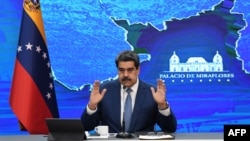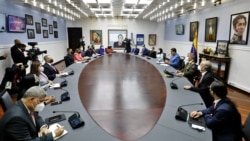U.N. investigators report judges and prosecutors in Venezuela are under intense political pressure from high-ranking officials to punish perceived opponents of the government of President Nicolas Maduro.
The three-member U.N. Independent International Fact-Finding Mission accuses the Maduro government of a pattern of serious human rights violations and crimes under international law in the context of its policy to silence and quash the opposition. It says the judiciary's independence has been eroded because of intimidation and threats against judges and prosecutors to do the state's bidding.
The mission was denied entry into Venezuela to conduct its probe. Its findings are based on 177 interviews and extensive analysis of thousands of pages of legal case files and other official documents.
Those findings will be presented to the U.N. Human Rights Council next week.
Chair of the mission, Marta Valinas, says a detailed analysis of 183 detentions of real or perceived government opponents presents a full picture of irregularities marring all stages of the criminal process.
"Based on the investigations and analysis conducted, the mission has reasonable grounds to believe that instead of providing protection to victims of human rights, violations and crimes, the Venezuelan justice system has played a significant role in the state's repression of government opponents," Valinas said.
The report notes most justices are appointed provisionally, and this makes them vulnerable to how they carry out their functions. It says several former judges, prosecutors and family members who had been subjected to threats have fled the country out of security concerns.
Mission member Francisco Cox Vial says judges order pretrial detention as a routine, rather than an exceptional measure. He says the mission reviewed 183 cases of detention. He says 113 of the detainees made allegations of having been tortured, sexually assaulted and/or subjected to other cruel treatment.
"In 67 of these, the detainees appeared in court with clear marks of mistreatment or raised allegations of torture, sexual violence, and/or cruel, inhuman or degrading treatment during court proceedings," Vial said. "The mission is also concerned that many of the detainees were handed back to the custody of agencies who allegedly tortured them."
In contrast to the treatment of government opponents, the report notes that in recent years, public officials in Venezuela, including some at a high level, have commited violations and crimes with impunity. The mission says the Venezuelan state is constitutionally obligated to investigate and punish all perpetrators of human rights violations, regardless of their position.
Mission members say they have repeatedly tried to contact the government and justice authorities to discuss its findings, but to no avail.





